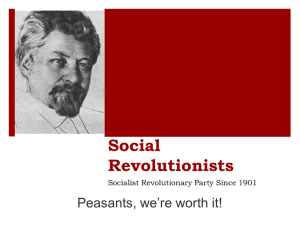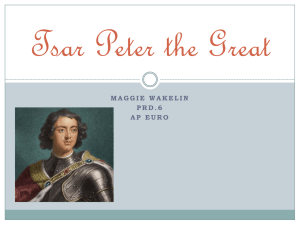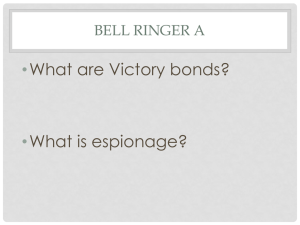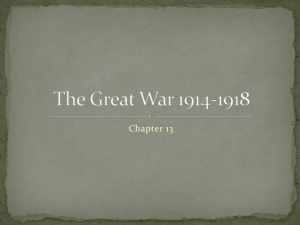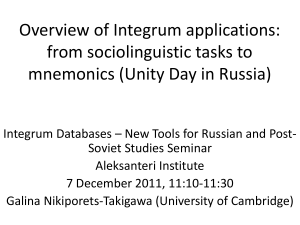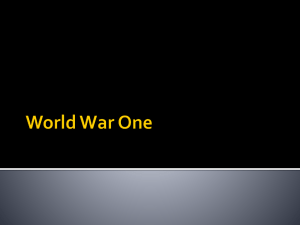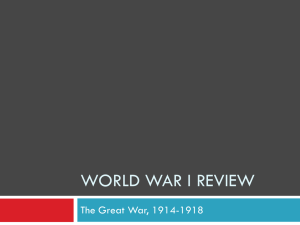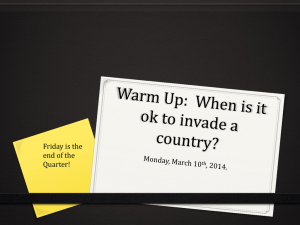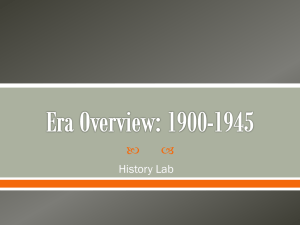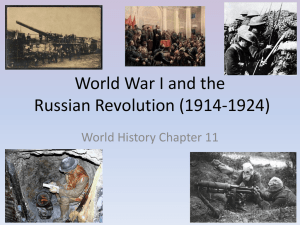Lecture on Warfare
advertisement
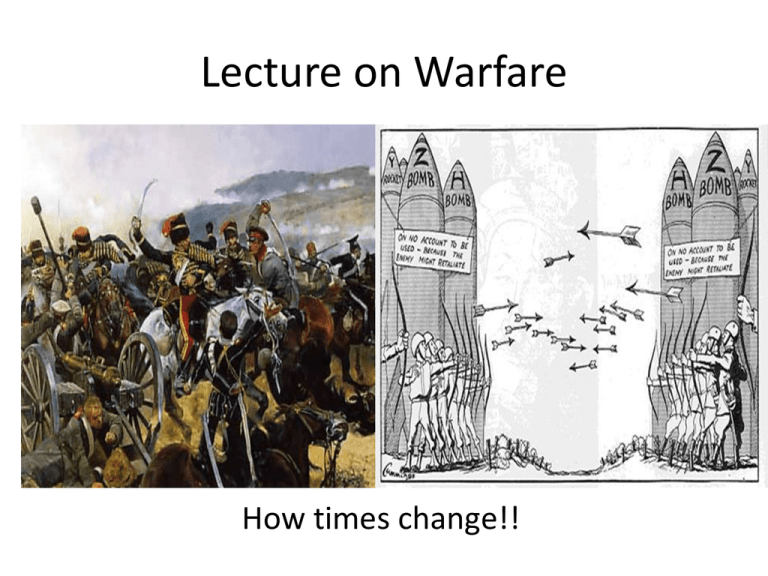
Lecture on Warfare How times change!! Aims • To establish key events over the time period. • To explain the role of war and how it impacts upon Russia. • To draw broad comparisons between the wars and the consequences. REMEMBER: YOU NEED TO HOVER OVER THE PERIOD TO MAKE SYNTHETIC COMPARISONS Crimean War • Crimean War involved Britain, France and Russia. • Fought between 1853 – 1856. • Was fought to establish Russian sphere of influence over the Balkan region and fend off interest from Ottoman Empire. • Widely seen as a debacle from all sides. Causes of Crimean War Long Term Short Term • Russia always seen as “policeman of Europe” – stopped uprisings and rebellions. • Ottoman Empire seen as “Sick Man of Europe” – Russia expected European powers to stay out of conflicts between them. • Napoleon III wanted France to be seen as protector of Orthodox Christians. • Conflict began over the role of Russia as protector of Orthodox Christians in the Ottoman [Turkish] Empire. • 1853 Russian forces moved into land that had belonged to Turkey, France and Britain feared expansion. • After the Russians destroyed the Turkish fleet at Sinope in the Black Sea in November 1853, Britain and France joined the war against Russia. Consequences of Crimean War • • • • Social Consequences Peasants still annoyed, 647 protests in first 4 months of Emancipation. Population increased. More demand for change, calls for 2nd Emancipation. Gentry declined and lost 1/3 of land. Political Consequences • Discredited “Nicholas system” – required change. 700,000 Russians died. • Ascension of Al II more interested in change, Tsar Liberator. • Gentry given representation in Zemstvo - elected. • Liberalism increased. • Many gentry clung to Tsar more, feared revolt. • Legal reforms introduced, old abuses of peasants lessened. Yet more consequences Economic • Allowed start of capitalist economy with peasants freed from serfdom. • Encouraged growth in banking and railways. • HOWEVER – easy to exaggerate, peasants still had redemption payments , mir restricted flow into towns and most farms still struggled to be self sufficient. • Symbolic change! • • • • • Military Serf armies still backward. Too large and hard to control. Poor provisions, i.e. armaments, clothing. Used to stop unrest on way to front. Military reformed, trained peasant reserve army possible. Military Changes • Dimitri Milyutin reorganised conscription, dropped from 25 years to 6 with 9 in reserve. • Conscription extended to all. • Military colonies ended and better training for officers introduced. • New military code. • NOT ENOUGH… Emancipation – Change or Turning Point? Views of Alexander II • “With the possible exception of Khrushchev, no ruler brought so much relief to so many of his people as did Alexander II” – Westwood. • “Nothing Alexander did altered or was intended to alter, the fundamental political fact of a God-created autocracy” – Stephenson Crimean War – Change or Turning Point? Russo-Turkish War • Fought 1877-1878 between Russia and Ottoman Empire. • Long term causes: – Russia wanted revenge from Crimean War. – Pan-Slavic argument. – Ottoman Empire verged on bankruptcy, caused great unrest in Balkan regions, i.e. Bulgaria, Serbia, Montenegro. Short term causes • 1876 Bulgarians began to revolt, conflicting reports of casualties. • Ottoman army was weak, so irregular troops used. • 15,000 massacred, including 5,000 in Batak. • Caused widespread anger in Europe. Russo-Turkish War • Large losses on both sides. Russia relied on Bulgarian troops to assist. • Forced to accept truce offered by Ottomans as Britain intervened. San Stefano Treaty. • Russians accused of atrocities against Muslims and Jews. • Damaged international reputation. Consequences of Russo-Turkish War • Treaty of San Stefano saw large gains for Bulgaria, which was now a client state of Russia. • Ottoman Empire recognised the autonomy of Bulgaria and the independence of Montenegro, Serbia and Romania. • Britain feared the expansion of Russian control and sphere of influence. • Congress of Berlin lost the gains from San Stefano – humiliation for Russia. • Russians had expected “something colossal”. • Increased tensions between AustriaGermany and Russia. Congress of Berlin (1881): Bismarck between Gyula Andrássy and Pyotr Shuvalov, on the left Alajos Károlyi, Alexander Gorchakov and Benjamin Disraeli “The reign of Alexander II which began with bright promise, and changed to dreary stagnation, ended in tragedy. The Tsar-Liberator was a victim of the unsolved conflict between social reform and the dogma of political autocracy” Seton Watson To what extent do you agree? Russo-Turkish War – Turning Point or Change? Russo-Japanese War 1904-1905 Russia vs. Japan Long term causes • Nicholas II was a weak man. Struggled to maintain control. • 1881 Emergency Decrees kept – unpopular. • Peasant discontent continued – land hunger. • Rival ambitions over Korea and Manchuria in China. • Russia needed warm water port, Port Arthur. Short term causes • Minister of Interior Phleve – Russia needed a “short victorious war to stem the tide of Revolution”. • Japanese negotiations with Russia failed. • Japan attacked Far East Russian Fleet without notification. Tsar seen to have been taken by surprise. Consequences Social Consequences • Nicholas II seen to underestimate Japan – “infantile monkey”. • Military humiliation led to increasing criticism of Nicholas – stagnation. • January 1905 strikes led to Bloody Sunday, 100,000 protest in St. Petersburg, troops opened fire, several hundred died. • Tsar not in the city but blamed for opening fire on his own people. • Unrest in countryside eventually calmed by army – General Trepov “Cartridges must not be spared”. • • • • • Political Consequences Political pressure put on Nicholas II, Zemstvos demanded change. Nicholas’s uncle Grand Duke Sergei assassinated (not the meerkat). 1905 Duma set up, too little too late. St. Petersburg soviet became more important. Witte appointed PM and Liberals formed Octobrists to support government. Yet more consequences • • • • Military Consequences Morale very low after 1905, added to by poor pay and conditions. Troops rebelled on TransSiberian railway. Several mutinies – naval mutiny on Potemkin Warship in June. Still generally loyal. Economic Consequences • Tsar agreed to end redemption payments for serfs – some agricultural improvements. • Economic depression 19021906. • Stolypin’s agrarian reforms helped create a new consumer based domestic market. • Still uncertain growth and industrialisation. • Foreign investment still high and possibly led to WWI. “Give the state twenty years of quiet at home and abroad, and you will not recognise the Russia of that day” – Stolypin 1909 To what extent do you agree? Russo-Japanese War – Change or Turning Point? World War I – Final Nail or beginning of the end? Causes Long Term • Russia needed allies as Prussia (Germany) grew stronger. • Allied with France and eventually Britain = Triple Entente. • Was embarrassed by the Balkan Wars 1912-13, Europe saw Russia as politically and militarily impotent. • Arms race and colonisation made Europe increasingly unstable. • • • • Short Term Balkan states began to agitate for independence. Russia saw Bulgaria as a prime Slavic state. Serbia another interest for Russia, had to protect it against Austrian aggression after assassination of Franz Ferdinand. I say don’t you know [this], you say you don’t know [this] I say…take me out! Initial consequences • 8 million casualties, 1.7m dead and 2.4m captured. • Hardship at home. • Tsar Nicholas II blamed for defeat along with his wife and Rasputin. Optimists Argument (Don’t worry, be happy) • Optimists argue that Russian autocracy would have coped with calls for change, if WWI had not occurred. • It needed something dramatic, i.e. WWI, for Russia to change as Russians would inevitably blame the leadership for failures in the War. • Optimists argue Tsars would have continued development, i.e. Duma, but would have retained authority. • Military failures led to economic hardships that impacted on lives of Russians on Home Front. Failures/Consequences • • • • Military Heavy defeats at Tannenburg and Masurian Lakes, lost 2x as many troops as Germans. Ammunition not able to be sent to Front, logistical inadequacies. Food rotted in stockpiles in Archangel. Criticism of Tsar for leaving Petrograd. • • • • Economic and Social Cost of war was huge, 3bn roubles. Workers received higher income and kept in work, but inflation went rampant. High population, food requisitioning and rations hurt populace. Optimists argue it was these conditions that contributed to unrest. Cchhaannggeess 2 Political changes • The military weaknesses and economic problems caused criticism of Nic II. • Abdication result of progressive bloc, family and military advisors. • Stephen Lee – “A turning point – which actually turned twice”. • • • • Pessimists - booo WWI strengthened existing progressive bloc. Working classes opposed autocracy – started with GS. Political parties also grew up. Pro-Bolshevik stance. Russian Revolution - 1917 Causes • • • • Long Term Weakness of Nic. II and unpopularity. Build up of opposition groups, including Bolsheviks. Weakness of Prov. Gov. and sense of lack of validity. Bolshevik promise of Dictatorship of the Proletariat would give way to stateless society. Short Term • Lenin’s sense of opportunism. • Prov. Gov. announcement of elections to be held hurried Lenin’s actions. • Kerensky allowed Bolsheviks Dual Authority, thus weakening own position in eyes of the people. Civil War Key FACTS!! WE NEED FACTS!! • Began Nov. 1917, Kerensky and General Krasnov attempt to retake power. • April 1918 General Kornilov’s army defeated and foreign powers intervene (British marines). • Czech Legion revolts in May, becomes focus for anti-Red Army forces. • July 1918 Tsar and family executed by Cheka. • August 1918 Trotsky begins executing deserters. • December 1918-1920 – Whites vs. Reds, began to see Nationalist movements, particularly in Ukraine and Poland. • By 1921 peasant armies roamed Russia aiming for freedoms from Bolsheviks. Impact of Civil War • Bolsheviks take having defeated all comers, established power. • Lenin retained Comintern but also focussed on peaceful international relations. • Introduced War Communism and NEP as economic actions. • War Communism and Cheka did cause divisions in Party. • Power more centralised under Politburo and Orgburo. World War II We never surrender the gains of October! World War II - Causes Long Term • Russia feared German expansion, despite Treaty of Berlin and non-aggression pact with Poland in Jan 1934. • Russia into LON as Germany and Japan pulled. • Spanish Civil War added to fear, Fascism vs. Communism, Russia feared to provoke Germany overly. Yet more Long Term!! • By 1936 Germany had antiComintern pact with Japan and Italy. • 1938 Anschluss of Austria added to fear. • Stalin felt appeasement pointless, signed Nazi Soviet Pact in 1939. – Would have given Soviet influence over Poland, Balkans and Finland. Short Term… • 1939 invasion of Poland signalled start of Western WWI, but for Russia still neutral. • Russia did build up troops in East. • Finland refused to allow Soviet troops to be stationed there, led to Finnish War Nov. 1939-March 1940 – lost 50,000 men and showed weakness. • Stalin did predict that Hitler would move after Denmark to “beat our brains in” – but still refused to believe reports of German attacks. Idiot. Consequences of WWII… Social Impact • Huge cost in human lives, 27m dead, 1.1m in siege of Leningrad. • Shortage of labour. • 50,000minimum deserters shot, showed failure of propaganda? • 2m+ women raped during WWII. • Treatment of prisoners harmed Russian relations with other countries post-WWII. Economic Impact • Huge cost of war and rebuilding after WWII. • Factories destroyed, agriculture on hold, railways damaged. • 1946-50 5Yr Plan, neglected consumer goods but forced labour of prisoners helped plan succeed. • Many projects flopped, including Volga-Don Canal. • Famine also occurred 1947. Political Impact and NKVD • • • • WWII has very little impact on leadership, Stalin catapulted to demiGod status. Became Supreme Commander of the Military. Politburo remained largely the same, mostly same personnel since 1938, i.e. Voroshilov, Kaganovich, Molotov and Khrushchev. Party membership increased from 3.76m in 1941 to 5.8m in 1945. NKVD: • Had been used to crack down on dissent and desertion. • Reverted to purging party post WWII. • Leningrad affair saw 200 supporters of A.A. Zhdanov killed. • Repression lessened with Khrushchev. COLD WAR – FINALLY!! 1947-1964 “Protracted state of tension between countries falling short of actual warfare” Long Term Causes • Ideological differences between Russia and USA. – Stalin claimed WWI due to “monopoly of capitalism”. • Russia under Stalin appeared invincible. • USA perhaps misread Russian gains in the East, i.e. Poland, as expansion. Probably just as much for an economic market. Short Term Causes • Fear of Russia, China and North Korea joining forces. • Spy network in Canada. • Kennan “long telegram” – warned of dangers of Russia, prepared for “deadly struggle for total destruction of enemy power” – taken seriously in USA. • Churchill’s Iron Curtain speech in 1946 – antagonistic. Early Actions • • • • • • • • • 1946 Truman Doctrine laid out America’s belief in support for “free peoples” – Russia saw it as a threat, even though it was directed at Greece. Marshall Plan rejected by Russia, saw it as spread of capitalism – lot of paranoid. Cominform set up in 1947, meant to be able to co-ordinate development, disbanded in 1956! 1949 NATO formed, anti-Communist. 1950 Korean War. 1952 and 1953 1st H-Bombs dropped by USA and Russia – arms race. 1956 Hungarian Revolution – spurred by destalinisation and sense of new freedoms, crushed Nov. 1956. 1957 Sputnik launched – space race on! 1962-1963 – Cuban Missile Crisis, build up of tensions around Cuba culminating in building and dismantling of Soviet missile bases. Consequential Consequences • Led to containment policy around Russia. • De-stalinisation introduced to meliorate external opinions. • Nuclear and space race very expensive so civilian life suffered. • Increasing levels of opposition in “new Russia”. • Did show Russia was willing to make a point, but did not want WWIII. Nikita Khrushchev repudiated the trials in a speech to the Twentieth Congress of the Russian Communist Party: "The commission has become acquainted with a large quantity of materials in the NKVD archives and with other documents and has established many facts pertaining to the fabrication of cases against Communists, to glaring abuses of Socialist legality which resulted in the death of innocent people. It became apparent that many party, Government and economic activists who were branded in 1937-38 as ‘enemies,’ were actually never enemies, spies, wreckers, etc., but were always honest Communists. They were only so stigmatized and often, no longer able to bear barbaric tortures, they charged themselves (at the order of the investigative judges – falsifiers) with all kinds of grave and unlikely crimes. And that, ladies and gentlemen, in 48 slides and 15 billion hours, is the end of Russian Warfare. What have we learnt? Chill out and don’t fight.

